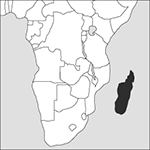A large island lying in the Indian Ocean off the eastern coast of Africa. It became separated from the main mass of Africa at a time when India was migrating northwards across the Indian Ocean, about 95 Ma ago. Madagascar is famous for the occurrence of primitive prosimians (lemurs) which survive there because of a lack of mammalian predators. Elsewhere, prosimians have been greatly reduced, probably as a result of competition with true monkeys and apes following their appearance in the Oligocene.

Source: MAPS IN MINUTES™ © RH Publications (1997)
Capital:
Antananarivo
Area:
587,041 sq km (226,658 sq miles)
Population:
22,599,098 (2013 est)
Currency:
1 ariary=5 iraimbilanja
Religions:
traditional beliefs 52.0%; Christian 41.0%; Muslim 7.0%
Ethnic Groups:
Malayo-Indonesian; Cotiers (mixed Malayo-Indonesian, African, and Arab); French, Indian, Creole, and Comoran minorities
Languages:
Malagasy, French (both official); English
International Organizations:
UN; AU; SADC; Non-Aligned Movement; WTO
A large island country lying 450–900 km (280–560 miles) distant from the south-east African coast, to which it runs parallel.
Physical
A broad plain in the west rises to the Ankaratra Mountains, which slope steeply eastward to the Indian Ocean. The eastern coast is hot, very wet, subject to cyclones, and densely clad with rainforest. As a result of the island becoming separated from Africa during the period of continental drift, many of its plant and animal species, for example lemurs (prosimians), are unique.
Economy
Economic activity in Madagascar is mainly agricultural, employing four-fifths of the population. Coffee, vanilla, shellfish, and sugar are major exports. Cattle breeding is extensive and meat processing is the principal industry; other industries include seafood, soap, and brewing. Chrome ore is mined and exported, and there are bauxite deposits. The 2009 coup and its aftermath led to international sanctions, a slowdown in investment, and a collapse of tourism.
History
The Madagascan people are of Indo-Melanesian and Malay descent, mixed with some Bantu, Arabs, Indians, and Chinese. The time of arrival of different groups is controversial. Arab traders were probably visiting by the 10th century. In 1500 a Portuguese sea captain, Diego Dias, chanced on the island, calling it São Lourenço. However, Marco Polo had already named it Madagascar from hearsay knowledge, and this name endured. In the following centuries Dutch, English, and Portuguese vessels made frequent visits, and the French set up trading centres. Many of these were used as pirate bases. By the beginning of the 17th century a number of small Malagasy kingdoms emerged, and later the Sakalawa, from the west of the island, conquered northern and western Madagascar, but their kingdom disintegrated in the 18th century. The Merina people of the interior were later united under King Andrianampoinimerina (ruled 1787–1810), and became the dominant group on the island by the early 19th century.
In 1860 King Radama II gave concessions to a French trading company. This led in 1890 to a French Protectorate, although resistance lasted until 1895. After 1945 Madagascar became an Overseas Territory of the French Republic, sending Deputies to Paris. It became a republic in 1958, and regained its independence (1960) as the Malagasy Republic, changing its name back to Madagascar in 1975. Severe social and economic problems caused recurrent unrest and frequent changes of government. Admiral Didier Ratsiraka was elected President in 1982 and again in 1989, working closely with a Supreme Revolutionary Council. A new multiparty constitution was adopted in 1992 and Albert Zafy became President following elections in 1993. In 1996 he was impeached, and later defeated in presidential elections by Ratsiraka. Marc Ravalomanana was narrowly victorious in 2001; however, Ratsiraka rejected the result, leading to a short period of chaos until he left the country. Instability continued and in 2009 Ravalomanana was overthrown by a military coup that installed Andry Rajoelina as President. Attempts to form a transitional unity government encompassing Ratsiraka, Zafy, Ravalomanana, and Rajoelina foundered; Rajoelina remained President and promulgated a new constitution in 2010. In 2013 Hery Rajaonarimampianina, a protégé of Rajoelina, was elected President, retaining power in the 2014 election and surviving an attempt at impeachment in June 2015.
- lake
- Lake Erie, Battle of (10 September 1813)
- Lake George, Battle of (8 September 1755)
- Lake Mungo
- Lalande 21185
- Lalande, Joseph Jérôme (Lefrançais) de (1732–1807)
- Lally, Thomas Arthur, Comte de, Baron de Tollendal (1702–66)
- Lamarckism
- Lamarck, Jean Baptiste Pierre Antoine de Monet, Chevalier de
- Lamarck, Jean Baptiste Pierre Antoine de Monet, Chevalier de (1744–1829)
- Synge, Richard Laurence Millington
- synkinematic
- synneusis
- synodic
- synodic month
- synodic period
- synomone
- synonym
- synonymous substitution
- synonym ring
- Synopsys
- synoptic
- synoptic meteorology
- synorogenic
- synovial membrane